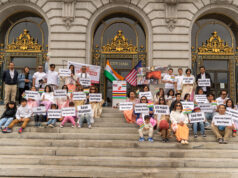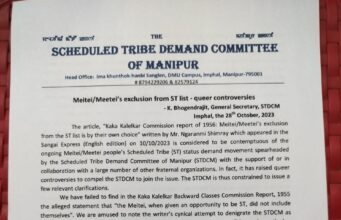Statement on the International Day of the World’s Indigenous Peoples
Imphal: 9th August 2015: Indigenous peoples must survive first before they can fulfill their development aspirations. This truism is a most critical and relevant issue in Manipur today. UN Secretary General Ban Ki Moon had stated, “The interests of the indigenous peoples must be part of the new development agenda in order for it to succeed. […] Together, let us recognize and celebrate the valuable and distinctive identities of indigenous peoples around the world. Let us work even harder to empower them and support their aspirations.” Yet, states and their governments are still unable to translate this call into effective action that truly benefits the indigenous peoples. India is one such glaring example where its vast indigenous population faces continuing denial and deprivation of their rights.
Since 1994, when the UN General Assembly first marked 9th August as the International Day of the World’s Indigenous Peoples, as part of the first year celebration of the first UN Decade for Indigenous Peoples, the situation of the indigenous people of Manipur has progressed from bad to worse. While we, indigenous peoples have been gaining landmark achievements at the global advocacy level with the establishment of the UN Permanent Forum on Indigenous Issues in 2000, the appointment of the Special Rapporteur on the rights of indigenous peoples, the adoption of the UN Declaration on the Rights of Indigenous Peoples (UNDRIP) in September 2007, where India is one of the signatories, the establishment of the UN Expert Mechanism on the Rights of Indigenous Peoples (EMRIP) in 2007 and the adoption of the Outcome Document of the World Conference of Indigenous Peoples in September 2014, the reality is far from these stated gains.
Discrimination, land alienation and pauperization are at an alarming upward trend despite these gains that have facilitated increased attention of the UN agencies, funds and programs and other public and private institutions to indigenous peoples. Manipur’s indigenous peoples remain subjected to exploitation, systemic and institutional discrimination, militarization, conflicts and untold suffering from the widespread violation of our rights. Asian States have renewed their commitments towards the achievement of the ends of the UNDRIP, but we see the governments’ denials and failure in their obligations to respect, protect, promote and fulfill the rights of indigenous peoples.
While the rest of the world is racing ahead, our people are faced with dam projects and other infrastructure built by the government without our free, prior and informed consent that have failed. Our precious forests and arable lands are being taken away, and internal displacement without any security of livelihoods carries on unabated. In Manipur, indigenous communities and their lands are being taken over by aggressive infrastructure
and expansion schemes. The Ithai Dam of Loktak HEP, Khuga Dam and Mapithel Dam are clear examples of this aggression and its tragic impacts. National laws that have been enacted to protect our forests and lands are not implemented. There are no reliefs, rehabilitation or appropriate resettlement efforts of the government despite the enactment of a new law on land acquisition, rehabilitation and resettlement. In fact, it appears that the trend within the present government of India is to undo these very laws through amendments that favour the private and corporate sector.
Critically, the rights violations of our indigenous people disempowered our women to assume their vital role in sustainable resource management, food security, protection of cultural heritage and traditional knowledge, and community unity. Indigenous women are extremely vulnerable to violence as a result of deprivation of land rights, lack of access to sustainable livelihoods and decent work, inadequate social services such as healthcare and education, violation of their rights as women, as well as out of various forms of conflict. Land grabbing and dispossession continue to push many women further into the informal economy or migration for work and livelihoods, where they are open targets of exploitative forms of labour, trafficking, contemporary forms of slavery and violence.
As legitimate democratic actions to ensure our survival, protect our land and natural resources are pursued, indigenous peoples’ human rights defenders (IPHRDs) including women and youth, are criminalized resulting in arbitrary and/or incognito detention, torture, enforced disappearances and political killings through “fake encounters”. A current public campaign for an appropriate legislation in the State to ensure our survival and protect our lands has led to incredible state violence in response, resulting in at least one police killing and dozens being injured and tortured, along with government deceptions to avoid the legislation demanded despite repeated resolutions by the State Legislature.
Increasing disasters due to climate change are not being addressed on a priority basis. Mitigation and adaptation to climate change is being left to our indigenous communities to fend for themselves. Engaging with governments for policy reforms for the protection of our collective rights has yet to become a structurally protected right in the democratic polity of India. We continue to call upon the governments of Manipur and India to take concrete actions to respect, recognize, protect and promote our collective rights as affirmed by the UN Declaration on the Rights of Indigenous Peoples, 2007. The post 2015 Development Agenda as well as climate change solutions and actions should fully respect and protect our rights especially to our lands, territories and resources, and ensure our very survival.
As we observe the UN’s International Day of World’s Indigenous Peoples, we are inspired by our human rights defenders, especially the indigenous women human rights defenders, and salute their courage and sacrifices in the defense of our survival, dignity and rights. We celebrate our diverse cultures in Manipur, and we are proud of our unique history and identities.
ENSURE THE SURVIVAL OF THE INDIGENOUS PEOPLE OF MANIPUR!
Dr. Laifungbam D. Roy
President
Elders’ Council
CORE is an indigenous peoples’ NGO with Special Consultative status in the UN Economic and Social Council











